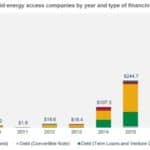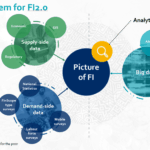Off-Grid Solar Is Entering a New Era of Growth: GOGLA’s Off-Grid Solar Forum Explores Why
The off-grid solar sector is now entering its second decade of significance as an energy source. And with this shift come a host of new challenges, opportunities and growing pains. These dynamic changes will also take center stage at the Global Off-Grid Solar Forum Expo, jointly organized by GOGLA (global association for the off-grid solar energy industry) and the World Bank Group’s Lighting Global initiative from Feb. 18-20 in Nairobi, Kenya.
Here are a few of the forward-looking conversations we’re anticipating at this year’s forum:
An increased focus on financial performance should support sustained growth and improved access to finance.
We see from our sales data collection work that the overall value of sales in our industry continues to show healthy growth. Yet, we also see that equity investment has stagnated after a peak in 2016, and that more commercial debt funders still don’t find their way to the industry easily. We often hear that traditional funders have a difficult time understanding financial performance of companies in our industry. The public failure of some of them in 2019 (Mobisol being the most visible) led to many questions on how financially healthy the industry really is. With that, we see that the topic of financial performance is now significantly higher on the agenda than it was a few years ago.
Related article: What Rural Solar Energy Enterprises Can Learn from Mobisol’s Hard-Earned Lesson
Going forward, this should lead to better intelligence on how the sector as a whole performs – and I fully expect this to come with many positive stories. We already hear from some companies indicating they have now reached sustained profitability – and many others claim to be close. Working with several of our industry and investor members, GOGLA together with IFC and CGAP are developing tools to make such stories more transparent. I hope we will see the first results of these efforts in 2020.
Greater transparency will bode well for the industry. Firstly, sharing this information makes our industry more robust, and better prepared for potential future shocks and failures. Secondly, I believe it may lead to new investors entering our space, potentially with cheaper capital, supporting continued and reinforced growth over the coming decade.
A growing realization that current business models won’t reach every household now leads to more public funding.
Off-grid solar has clearly proven itself as the most affordable and effective option to electrify a household or a farmer. Yet, it is also a clear fact that many households that still lack energy access today are either too poor or too remote even for off-grid solar companies to reach with a profitable and financially stable business model. And while the reach of the market is extending into more and more countries, there is no doubt that the bulk of the off-grid solar market remains concentrated in just a few strong markets (and even in these markets there are still many households which remain unserved due to the affordability challenge).
We are now seeing this realization translating into more and more support programs, with public funding stimulating companies to reach households they wouldn’t otherwise be serving. “Result-based financing” is the buzzword here – a concept that has now been tested for several years and has shown promising results. Building on this, new market support programs are starting to take off in more and more countries. The uptake has been encouraging, and while it is still a bit too early to celebrate the results – it looks positive.
It is important, however, not to get carried away either. Such developments will always impact the market, creating winners as well as losers. We should be careful of what we are asking for: Subsidy schemes can do more damage than good if the details go unnoticed, or expectations are unrealistic. It is important that we learn from early experiences and apply these lessons well.
Companies offer an increasingly large range of solutions, with bigger individual impacts. That is good news, as long as we don’t ignore the foundations.
We see that many off-grid solar companies today are looking to expand their business, adding productive use appliances and larger solar home systems to their product offerings. This helps them grab bigger margins in the market, to sell more and larger products to their existing customers, or to open up new market segments. That is great news that deserves to be encouraged. A broader range of products will mean more demand being fulfilled. Also, higher capacity products and productive use appliances tend to contribute more to economic development and job creation.
However, this trend could have a flip side if it means that companies, governments and donors lose interest in low-capacity, entry-level solar lights and solar home systems. These are the products that are selling in the millions per year, and which reach the furthest in serving poor and remote customers. It is these products that generate, with a distance, the biggest total impacts: in saving billions of dollars in household expenses, in improving the life quality of millions of people, and in avoiding the black carbon emissions from kerosene that have such a high climate-warming effect. It is these low-capacity products that give us a chance to achieve Sustainable Development Goal 7. And while this market segment becomes more commoditized and more commercial, it continues to need support in developing a good enabling environment, with regulation that protects the customers and keeps the industry sustainable.
So, while it is good to see the industry expand its scope and definition with these larger capacity products, we shouldn’t lose sight of those customers at the bottom of the pyramid.
Note: NextBillion is a media partner for the Global Off-Grid Solar Forum & Expo. Readers can get a discount when they register using the code NEXT_BLLN_10.
Koen Peters is the Executive Director of GOGLA.
Photo courtesy of GPA Photo Archive.
- Categories
- Energy



